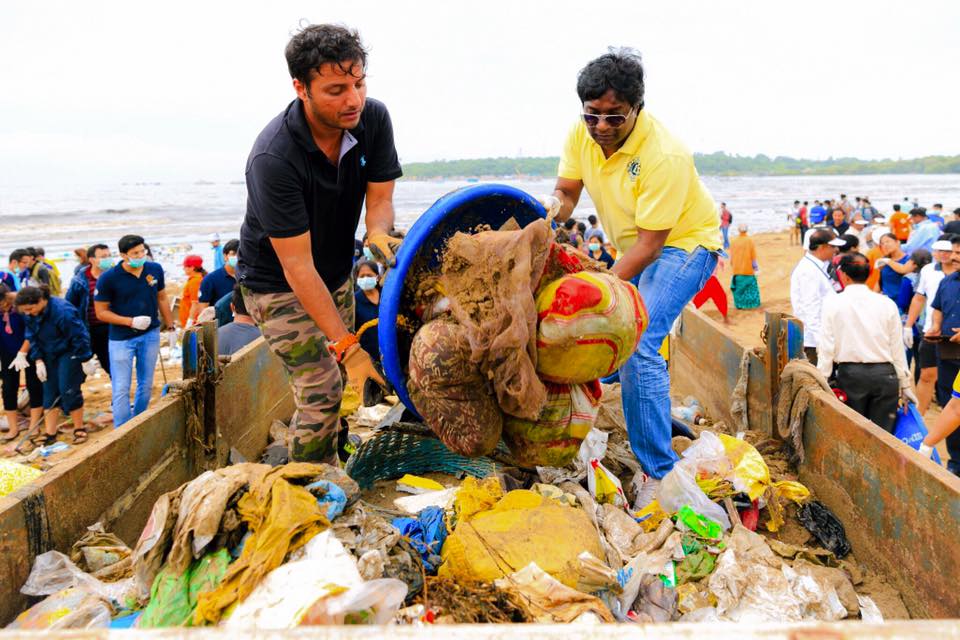In 2015, Mumbai-based lawyer Afroz Shah spearheaded a movement to clean the city’s Versova beach. It evolved to become the largest beach clean-ups in the world, garnered praise and awe from around the world, and was recognised by no less than the United Nations, which awarded him the Champions of the Earth award.
The Logical Indian interviewed Mr Shah about his journey, his inspirations, and guidelines on how we should go about protecting our environment. Here are some excerpts.
How did you initiate the massive Versova beach clean-up?
I am a lawyer at the Mumbai High Court. Two years ago, I moved to Versova, Mumbai. The beach there was unbearably polluted. There was plastic everywhere – on the jetty beach, on the sand, on foot-walks – plastic everywhere.
I decided that I should do something. There were various options before me. I could file a public interest litigation (PIL) at the Bombay High Court and invite the court to pass orders, or I could complain to local municipal authorities about the issue. But I wanted to take the correct and truthful path. It was my planet, my environment, my ocean and my human right. I decided to wear my gloves and solve the problem by connecting with my ocean and getting people to help me along the way.
In the beginning, there were only two of us. I still remember the first day; I picked up five bags full of plastic. We began in October 2015, and till date, we have removed 4300 tonnes of plastic. We clean every Saturday and Sunday. We also run awareness programmes among fisherfolk and slum dwellers.
Your journey has been very eventful and lauded internationally. Even the United Nations has recognised your accomplishments. What drives you?
Consistency, persistence, sincerity – this is what I tell my volunteers all the time. All of us need to build a bond with the ocean and the environment.
It’s all about responsibilities. Initially, people kept asking me why I was doing the municipality’s job, and that what I was doing was futile. But I continued nonetheless. For me, it’s like a date with the ocean.
What are the main issues that plague our oceans?
According to a World Economic Forum (WEF) study, by 2050 there will be more plastic in the ocean than fish. We are all responsible for this travesty – even me. The marine ecosystem is fragile. Imagine if I throw faeces and waste at your home – would you sit quietly? Would you not take action? But can aquatic animals and plants petition the High Courts or the Supreme Court to take action against us when we throw plastic, faeces and rubbish into their homes?
Plastic islands as big as countries are floating across our oceans even as we speak. There are 19 beaches in Mumbai. It falls upon us as citizens to take care of our environment. We must give it time, money, and effort. We must do it: we owe it to nature.
What can we as individuals do to help the marine environment?
The beach we worked on was 2.9 km-long. Till date, 90% of the plastic has been removed. The fishermen community lives to the north. They come and help us sometimes. They feel it is as much their responsibility as it is ours or anybody else’s.
Towards the south of the beach, there are slums. In this region, there are 32 toilets for over 15,000 people. Inhuman conditions of living are toxic both to the inhabitants and the environment. We conduct awareness programmes in this area, and clean toilets occasionally.
Why is the on-ground involvement indispensable?
Vinoba Bhave spearheaded the Chipko movement. Those days the biggest concern was deforestation. He told the country to “Hug a tree”. And he mobilised the entire nation into a whole movement which became a rallying cry for all the environmental campaigns and actions that followed. The Chipko movement was successful because it involved extensive ground involvement and grassroots action.
Like I told the UN environmental head when he visited: It is all about ground action. People talk, they don’t do ground work.
Some people complain all the time; some volunteers take action – but only for a day or an event or selfies. Our association with the ocean is a lifelong engagement.
How can the Government and the law help protect the marine ecosystem?
Take solid waste management as an example. We have too many laws, rules and regulations but little ground action, We require law, but we require ground action in a huge way.
The law isn’t enough – take it from me, I’m a lawyer. We are all stakeholders, we all have to be involved. We – each and every one of us – have to go beyond the call of the law and create a bond with nature, an intimate bond.
Any concluding words?
We will have to all get our hands dirty and volunteer to clean our beaches and seas. Don’t depend on artificial entities to fight for natural causes – do it naturally. Natural problems need simple, natural answers. Let’s work together to make our oceans clean again.











